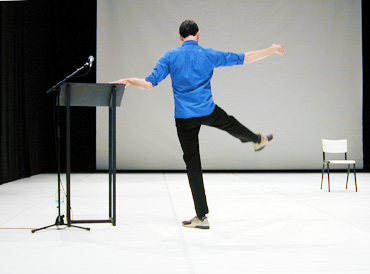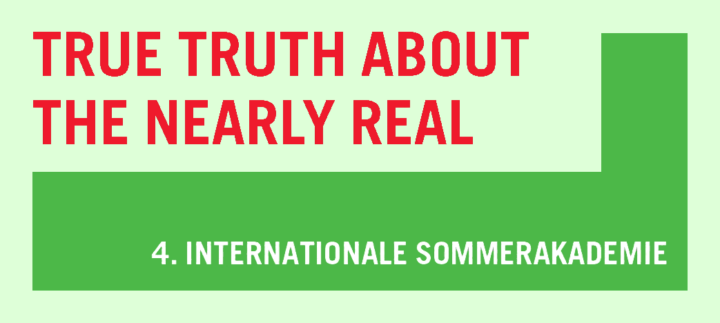Initially, the focus was on playing with spatial takeovers: Thomas Kapielski led us through a show at the Museum für Moderne Kunst that was unknown to him, the exhibition Skinny Bag Laboratories failed and succeeded in confronting the massive structural machinery of Frankfurt’s main railway station, in Vienna a local artists’ scene was isolated and transplanted within 24 hours into a run-down one-and-a-half room flat. A similar idea of scene exhibition characterised a work in Hamburg, when three different clubs invited people into the plush of the small Gründgens Lodge every afternoon.
At the Kunstencentrum Vooruit in Ghent, Belgium, Unfriendly Takeover had a writer read from his works behind closed doors in an empty ballroom, hosted a football game and a lonely party.
Such actions and events are about – in the words of Hans Ulrich Obrist – “infiltrating existing structures and institutions” with the aim of “(creating) a heterogeneous situation in which different practices and forms can intermingle.” Not having a fixed location of one’s own, but always consciously seeking other connections, networking anew, was one of the basic principles of site-specific curating, as Unfriendly Takeover had developed.
Parallel to this, Unfriendly Takeover expanded its spectrum: In the Frankfurt harbour under the Honsellbrücke, Gemeinschaftspraxis (shared practice) was created – originally together with the deufert&plischke): a temporary venue with club, theory and performances. The salons, which first emerged here under the name Gemeinschaftstheorie (Community Theory), later also brought car testers into conversation with cultural theorists and computer linguists about the value of mistakes, an ethnologist explained the meaning of an erratically charged stone to Indian refugee activists and the German dubbing voice of Marilyn Monroe competed with Alfred Biolek for the more beautiful sound.
In 2004 – 2006, Unfriendly Takeover organised the series Performing Lectures, among others, and shifted the question of takeover to more abstract terrain: In the discussion about the blending of artistic practice and theory, the crossing of genre boundaries and self-reflexive art and creative science, the format of the lecture performance, which functions performatively and discursively at the same time, has taken on a special status for some years now: The lecture as performance, reflection as self-reflection, content as form, language as act. Approaches from different artistic disciplines are deliberately juxtaposed here. The speakers come from choreography and dance, theatre, literature, music and the visual arts. Guests have included Xavier Le Roy, Jérôme Bel, Stefan Kaegi, deufert+plischke, Mårten Spångberg, Felix Kubin, Tim Etchells, Lone Twen, Martin Nachbar, Daniel Belasco Rogers and many others.
With four editions in 2006/07, the Dictionary of War (together with Multitude e.V.) was a collaborative platform for the production of 100 terms on the topic of war, formed and presented in four two-day editions in Frankfurt, Munich, Graz and Berlin, each with 25 contributions from academics, artists, theorists and practitioners. As lectures, performances, films, slide shows, readings, concerts in strict alphabetical order as a marathon discourse. From NBC weapons to civilian population, from parachute invasion to Facts on the Ground, from potato to collateral damage, from infowar to radar surveillance, from homesickness to resistance. Finally, a selection of contributions was published as a book by Merve-Verlag, Berlin.
Within seven years, Unfriendly Takeover, as an independent, voluntary curatorial group, organised around 20 programmes and programme series with about 100 individual events at more than 30 locations and with over 300 different artists, speakers, interlocutors. Each project with its own location, its own composition, its own audience.
Unfriendly Takeover were Andreas Bohn, Manuela Demmler, Janine Hauthal, Jens Holst, Mikael G.B. Horstmann, Florian Malzacher, Anke Schleper, Heike Schleper und Bernhard Schreiner.
www.unfriendly-takeover.de




